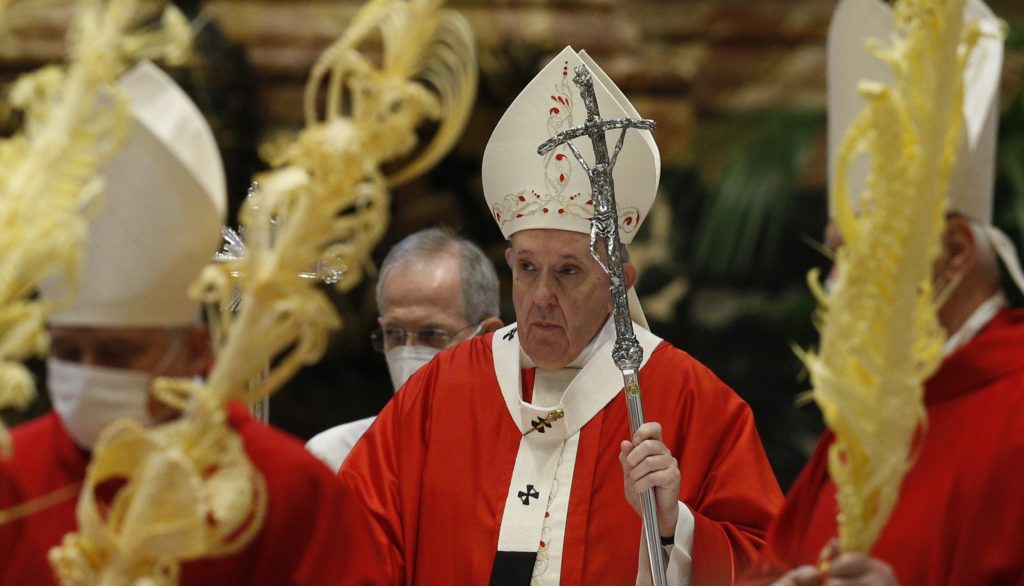The altar of the Chair of St. Peter was the setting for the Palm Sunday Mass, which commemorates the triumphal entry of Jesus Christ into Jerusalem but also proclaims the Gospel of the Lord's Passion. This combination always gives rise to a "sense of wonder", which Pope Francis used as the guiding thread of his homily.
On this occasion there was no solemn procession with the Palms or Palm branches before the Mass that usually takes place in the square starting from the central obsleisk, but the entrance of the Lord into the holy city was commemorated more briefly inside, at the foot of the altar of Confession; and the number of participants was reduced.
Moving from awe to amazement
In the context of Easter, Jesus surprises us in various ways, the Holy Father explained. First of all, because the victory that his people expect does not come by means of the sword, but by means of the cross, and this difference shows that "amazement is different from simple admiration", and his followers "todmiraban to Jesus, but they were unwilling to allow themselves to be surprise by Him".
To admire Jesus is not enough. It is necessary to follow his path, to allow oneself to be questioned by him, to move from admiration to amazement.
Pope FrancisPalm Sunday
Today, as in every age, there are many who admire Jesus for various reasons - his works, his example, his teaching - without this changing their lives; however, "to admire Jesus is not enough. It is necessary to follow his path, to allow oneself to be questioned by him, to pass from admiration to amazement".
In every wound
For us, the cross is equivalent to humiliation. Now, in the words of St. Paul in the letter to the Philippians, which affirm that Jesus "emptied himself, [...] humbled himself" (Phil. 2, 7.8). Francis recalled them and described the cross of Jesus as a "cathedra" in which the Redeemer "teaches us in silence" with his own humiliation, voluntarily assumed. It was not necessary, but he wished to "descend into our suffering" in order to recover us. He tasted everything of ours, even the most painful or shameful, transforming it. "Now we know that we are not alone. God is with us in every wound, in every fear. No evil, no sin has the last word."
Let us be surprised by God's love
In short, to experience the joy of being a Christian we must allow ourselves to be "surprised every day by his admirable love, which forgives us and makes us begin anew", to feel "the wonder of grace" and to perceive "the beauty of our brothers and sisters and the gift of creation".
Let us look at the Crucified One and say to Him: 'Lord, how much You love me, how precious I am to You!'
Pope FrancisPalm Sunday
For this reason, at the end of his homily on this Palm Sunday, the Pope invited us to "begin with wonder": "Let us look at the Crucified One and say to him: 'Lord, how much you love me, how precious I am to you. In this is the greatness of life, in "discovering that we are loved. And in the beauty of loving.
Pope Francis said there is a first example of this amazement in the Gospel. It is the centurion who, on seeing him "die like this", exclaimed: "Truly this man was the Son of God! 15, 39). It is about astonishment because "I had seen him die while loving. He suffered, he was exhausted, but he continued to love". On the cross, "God has revealed himself and reigns only with the disarmed and disarming power of love".
For the second time
At the end of the Holy Mass on Palm Sunday, which marks the beginning of Holy Week, Pope Francis prayed the Angelus. Precisely, he made reference to the situation we are living in the context of the pandemic, which for the second time leads us to live a particular Holy Week: "We have entered Holy Week. For the second time we live it in the context of the pandemic. Last year we were more shocked, this year we are more tested. And the economic crisis has become heavier".
Jesus takes up the cross, that is, he assumes the weight of the evil that this reality implies, the physical evil, the psychological evil and above all the spiritual evil.
Pope FrancisPalm Sunday Angelus
"In this historical and social situation, what does God do?" the Holy Father asks, and the answer is clear: "He takes up the cross. Jesus takes up the cross, that is, he takes up the burden of the evil that this reality implies, the physical evil, the psychological evil and above all the spiritual evil, because the Evil One takes advantage of crises to sow mistrust, despair and weeds".
Respond as the Virgin
This must lead us to respond to God's love. "And what should we do?" exclaims Francis. The model "is shown to us by the Virgin Mary, the Mother of Jesus, who is also his first disciple." She followed her Son. She took on her own share of suffering, of darkness, of bewilderment, and walked the path of the Passion, keeping the lamp of faith burning in her heart.
An undeserved gift
With God's grace, "we too can make this journey. And, along the daily Way of the Cross, we meet the faces of so many brothers and sisters in difficulty": Pope Francis encourages us not to pass by, to let our hearts be moved to compassion and to draw near. "At this moment, like the Cyrenean, we may think: "Why me?". But then we will discover the gift that, without deserving it, has been given to us."
The Holy Father made a special commemoration before praying the Angelus prayer to the victims of violence, in particular to those of the attack that occurred this morning in Indonesia.













